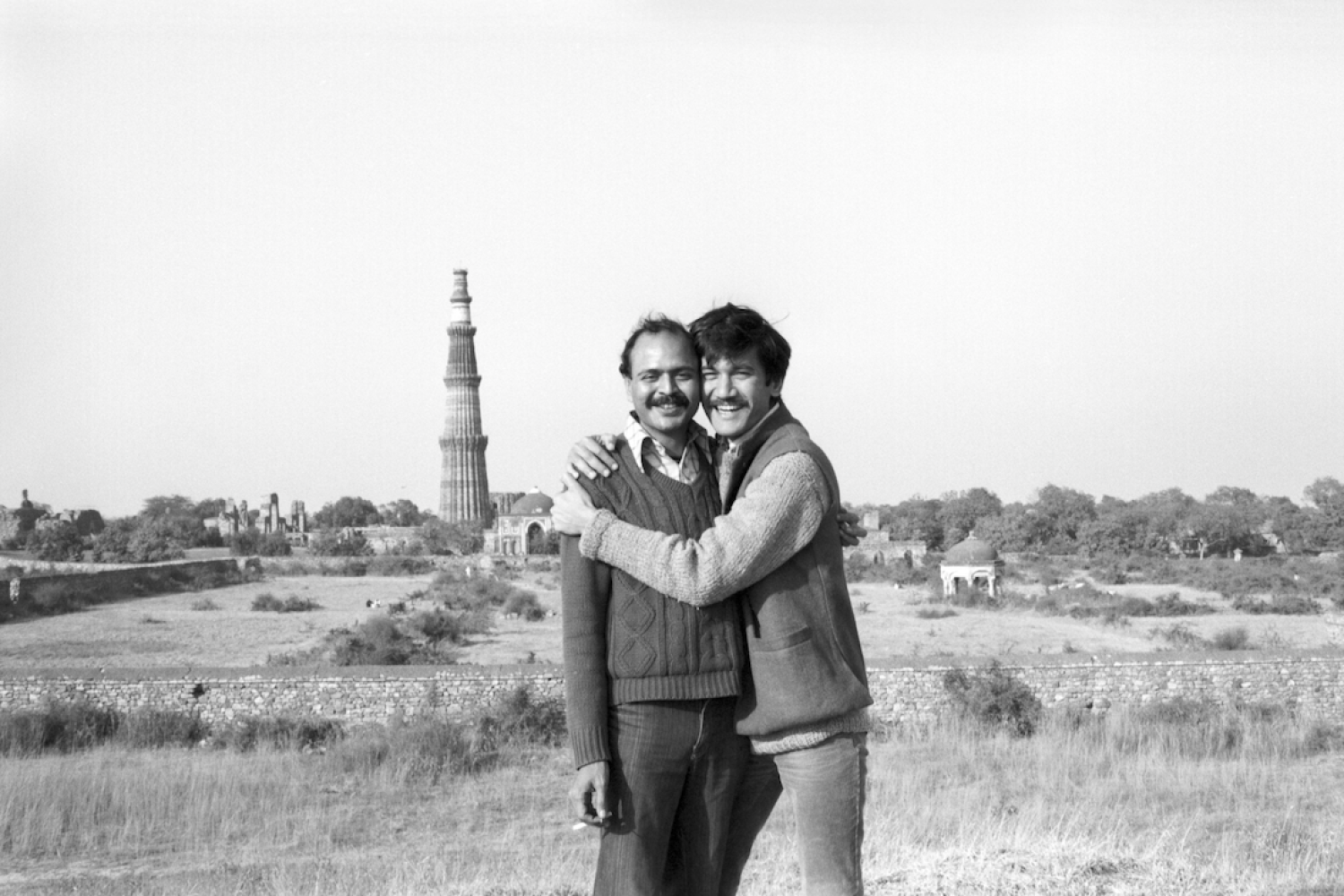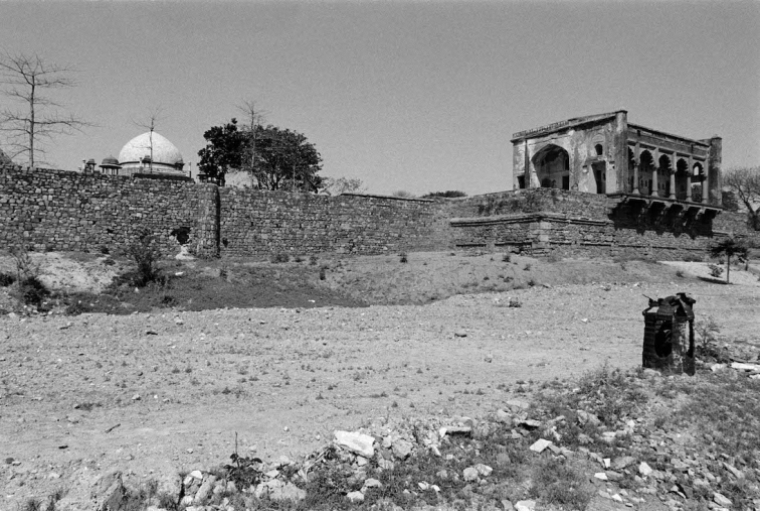
Medium : Archival inkjet print Size : 28 x 42 in Year : 1983/2022 Edition 1/5+2AP

Medium : Archival inkjet print Size : 28 x 42 in Year : 1983/2022 Edition 1/5+2AP
“Making photographs remains a great pleasure in my life and has been a means to rebut the prejudicial views of society around sexuality, race and gender,” says Sunil Gupta.
Cruising 1960s Delhi is a crucial series of black-and-white photographs shot in the 1980s in which Gupta composes a revisitation of a revisitation, a memory of a memory, contemplating personal movements of significance after he returned to Delhi for the first time on leaving the city as a teenager. With the lens as a buttress, the artist pursues a vivacious remembering of the nameless experimentations he encountered as a plucky, pubescent boy discovering his queerness through a sexual awakening. While these photographs seem to offer an architectural positivity, their potency unfolds in the moorish nooks and crevices of frequented local public areas in Delhi around the iconic Nizamuddin neighbourhood, as well as Gupta’s own house and its back-lane bifurcations, representing the geography of his childhood, where a complex, indeterminate freedom, outside the confines of language and social control, was performed in sexual exploits with other boys, some of them older and from different socio-economic classes. In the cathartic re-enactment of reconciling with this emotional landscape years later, Gupta uncovers the trauma of separation that he describes as the loss of his otherwise idyllic childhood, particularly noting the redaction of childhoods in queer experiences in the West, where such curiosities are considered more illicit than liminal.

Artist : Sunil Gupta Title : Untitled #13 (Cruising 1960s Delhi) Medium : Archival inkjet print
Size : 40 x 60 in Year : 1982/2022 Edition of 3 +1 AP
Christopher Street is among Gupta’s most important work, first conceptualized when the artist moved to New York City in 1976 from Canada, and previously India. Recalling his first experience of the city as surpassing his imagination, in the West Village Gupta found himself amidst a powerful moment of social and cultural revolution. The Stonewall Riots were a series of spontaneous demonstrations by members of the LGBTQ+ community against a police raid that took place in the early morning hours of 28 June 1969 at the Stonewall Inn on Christopher Street in Greenwich Village, leading to a crucial turning point in the gay liberation movement, following which there was a tremendous new display of openness and previously unparalleled acceptance within and towards the gay community. The 1976 Christopher Street photographic series is an early set of photographs Gupta created as a practising artist to not only channel his passion for open-minded expression but also enshrine a pivotal moment in his personal history. More than a nostalgic time capsule, these photographs reveal a community that shaped Gupta as a person and cemented his life-long dedication to portraying people who have been denied a space to be themselves — the emboldened origins of a thriving community in one of New York’s most dynamic areas, Manhattan’s Christopher Street.
Gupta’s series Delhi: Tales of a City features work from when Gupta had been photographing and researching historical sites in Delhi, particularly focusing on the period between 1638 and 1739, when the city was rebuilt as Shahjahanabad by the Mughal Emperor Shah Jahan. Shah Jahan created a patrimonial state that imposed his power and influence to control cultural life and the urban economy. Centuries later, Gupta finds these sites such as the Red Fort and Humayun’s Tomb, as well as the annals of Old Delhi, visited by a diverse cast of people across age, religion, caste and sexual orientation, who in their living and playing overthrow a repressive heritage and claim the sites as a decorative backdrop against which to compose their individuality. Their illustrative re-positioning at the heart of the narrative offers a deeper apprehension of queerness not only as an expression of sexuality but also as a broadening of modern culture and sensibility to honour individual and distinct possibilities.
Towards an Indian Gay Image and Exiles are connected bodies of work that address the lack of cultural legitimacy surrounding gay culture and iconography in Indian art and art history, as well as the absence of gay men in public spaces. In the early 1980s, Gupta was awarded a commission by the Photographers’ Gallery in London to visualise this project in his hometown of New Delhi. Gupta’s lens travels to various familiar locales around the city, from Nehru Park, Jama Masjid and Connaught Place to weddings and shared flats, and unloads their culturally repressive atmospheres through candid narrations of gay encounters and experiences, while his protagonists positively state their presence through the simplicity of being, consequently claiming a right to their place in society.
Invited by the Fierce Festival and the Healing Gardens of Bab in Birmingham to create a new body of photographic work with members of Journey, a Midlands-based inclusive social and supportive group for LGBTQ+ people seeking asylum, Arrival is Gupta’s latest body of work, produced in collaboration with his partner Charan Singh. Using the accoutrements of the nineteenth century studio portrait, which illustrated Victorian notions and ideals of behavioural identities, the artists invoke an anti-colonial legacy through empathetic, poetic gestures to express their sitters’ range of emotions, who are always anticipating when the process of their arrival will become complete. The project also serves as a reminder that homophobia is an anti-humanist cultural affliction, haunting nations beyond the Commonwealth.
About the Artist
Born in 1953 in New Delhi, Sunil Gupta has a Master’s of Arts from the Royal College of Art, London, and a PhD from University of Westminster, London, and has been involved with independent photography as a critical practice for many years focusing on race, migration and queer issues.
Gupta has several solo shows to his credit, including an important retrospective at the Ryerson Image Centre, Toronto (2022); as well as Charing Cross Hospital, London and Cambridge Wing Gallery, St. Mary’s Hospital, London, + Studio Voltaire (2022); Hales London (2021); Materia, Rome (2021); the Photographer’s Gallery, London (2020); Brixton Tate Library, London (2020, 2019); Hales Gallery, New York (2019); Stephen Bulger Gallery, Toronto (2018); the Contemporary Arts Museum, Houston (2018); Pelz Gallery, University of London (2017); Cardiff Photo Festival (2017); Whitney Humanities Centre, Yale University (2015); Vadehra Art Gallery, New Delhi (2009), to name a few. His group participations include the Barbican Art Gallery, London (2020); Vancouver Art Gallery (2019); Soho Art Gallery, New York (2019); Leslie Lohman Museum, New York (2019); the Kochi–Muziris Biennale (2018); the Philadelphia Museum of Art (2015), among many others.
Gupta’s published work includes the monographs: Queer: Sunil Gupta (Prestel/Vadehra Art Gallery, 2011); Wish You Were Here: Memories of a Gay Life (Yoda Press, New Delhi, 2008); and Pictures From Here (Chris Boot Ltd., New York, 2003). His latest publications are Lovers: Ten Years On, Stanley Barker, 2020; and Sunil Gupta: From Here to Eternity, Autograph, 2020 (which won the Kraszna-Krausz Photobook Award 2021), and London 1982, Stanley Barker, 2021. His work is in many private and public collections, including the Museum of London; George Eastman House (Rochester, USA); Tokyo Metropolitan Museum of Photography; Philadelphia Museum of Art; Royal Ontario Museum; Tate Modern; Harvard University, and the Museum of Modern Art. He is a professorial fellow at UCA, Farnham; visiting lecturer at Kingston University and visiting tutor at the Royal College of Art, London. He was lead curator for the Houston Fotofest in 2018. The artist lives and works in London, UK.
This article is an all exclusive from our August EZ. To read more such articles, follow the link here.
Date 19-08-2022